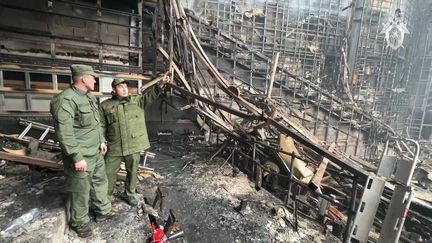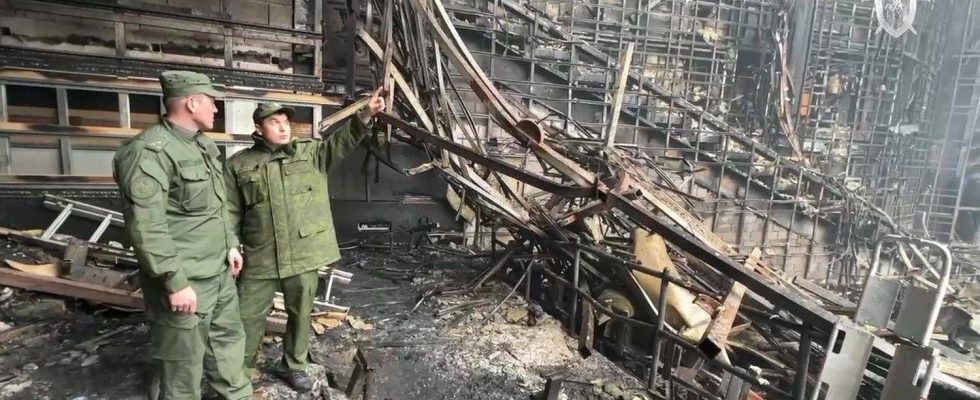The Islamic State group claimed responsibility for the attack that killed at least 133 people near Moscow on Friday, after taking responsibility for numerous deadly attacks on Russian soil in recent years.

Published
Update
Reading time: 4 min

It only took a few hours for the terrorist group Islamic State (IS) to claim responsibility for the Crocus City Hall attack. A shooting followed by a major fire in this concert hall in the suburbs of Moscow (Russia) left at least 133 dead on the evening of Friday March 22.
Around 1 a.m. (11 p.m. in Paris) on Saturday, the terrorist organization published a statement on Telegram claiming that its fighters were responsible for the attack. During the day, the jihadist group clarified that the assault had “was led by four IS fighters armed with machine guns, a pistol, knives and incendiary bombs”.
For its part, the Kremlin announced on Saturday the arrest of 11 people, including “four” attackers, while an investigation for a “terrorist act” was opened. But during his first televised speech since the tragedy, Vladimir Putin did not mention the jihadist organization’s claim.
Russia, target of ISIS for several years
This is not the first time that Russia has been the target of jihadist terrorism. ISIS notably claimed responsibility for the attack that injured 13 people in December 2017 in a supermarket in Saint Petersburg.
This time it was the Afghan branch of the Islamic State organization, the Islamic State in Khorasan (EIK), which claimed responsibility for Friday’s attack. The latter is active in Russia: two weeks before the Crocus City Hall attack, the Russian authorities announced that they had killed suspected members of an EIK cell in the Kaluga region, southwest of Moscow. They were suspected of plotting an attack against a synagogue in the capital. On March 3, six suspected EIK fighters were killed by Russian forces in Ingushetia, in the Russian Caucasus.
This group “has been fixated on Russia for two years, frequently criticizing President Vladimir Putin in his propaganda”declared to New York Times Colin P. Clarke, terrorism analyst at security consulting firm Soufan Group. “The EIK accuses the Kremlin of having Muslim blood on its hands, referring to Moscow’s interventions in Afghanistan, Chechnya and Syria”.
In its press release, IS specifies that Friday’s attack was part of “in the context (…) of the raging war” between the group and “countries fighting Islam”. But this is nothing new: Moscow and ISIS “have a long dispute”recalled Friday on franceinfo Wassim Nasr, journalist at France 24 and specialist in jihadism.
“There is, in quotes, a ‘blood debt’ between Russia and ISIS that goes back several years, to the war in Syria or Chechnya.”
Wassim Nasr, journalist at France 24 and specialist in jihadismat franceinfo
In Chechnya, the separatist rebels gradually became Islamized after the first Chechen war (1994-1996), until the allegiance to the IS of the Islamist armed rebellion in the Russian Caucasus, in June 2015. The same year, Vladimir Putin opened a new “front” abroad with the jihadist group by launching military interventions on Syrian soil, to support President Bashar al-Assad. In this context, the Russian army carried out strikes against IS positions.
Finally, Islamist groups in the Sahel regularly denounce Russia and paramilitary groups present on the African continent, like Wagner. All these Russian interventions are reasons for ISIS to target Moscow. The organization thus claimed responsibility for the suicide attack against the Russian embassy in Kabul (Afghanistan), which killed six people in September 2022.
Islamist groups active in the Russian Caucasus, joined by ISIS
Moscow is also confronted with Islamist terrorism on its territory, more particularly in the Russian Caucasus, where separatists have in some cases joined IS. In recent years, the terrorist group has notably claimed responsibility for a shooting killing five people in February 2018 in Dagestan, the killing of two police officers in Astrakhan in April 2017, and another shooting killing one person on December 29, 2015, again in Dagestan.
“At one point, ISIS had a form of emirate in the Caucasus which was completely eliminated by the Russians. Russian prisons are also full of jihadists from ISIS or other factions, so the dispute is very ancient”, comments Wassim Nasr. Nearly 4,500 Russians, particularly from this region, fought alongside ISIS, according to authorities. The organization would therefore have had no difficulty recruiting to carry out an attack on Russian soil.
It remains to be seen how this attack could have occurred without being foiled by the Russian authorities, who are nevertheless on alert in the context of the war in Ukraine. “There are still many unanswered questions given that Russia is a country at war with significant surveillance”note to BFMTV David Rigoulet-Roze. According to this researcher associated with the Institute of International and Strategic Relations, also a consultant in international relations, the attack “raises a certain number of questions about the performance of services” Russian intelligence.
It might be difficult to shed any light on this point. After the hostage-taking in Beslan by a Chechen commando in 2004, the Russian authorities blocked the investigation into possible security failures.

